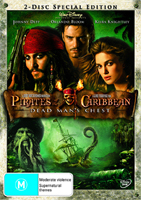Benedict Cumberbatch The Imitation Game
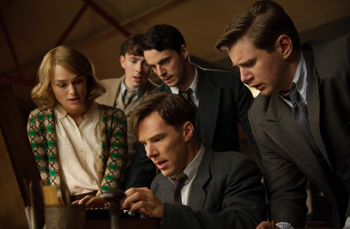
Benedict Cumberbatch The Imitation Game
Cast: Benedict Cumberbatch, Kiera Knightley
Director: Morten Tyldum
Rated: M
Running Time: 114 minutes
Synopsis: 1927, Sherborne School, Dorset, England: 15-year-old Alan Turing is shy, awkward, solitary and bullied. Months of misery at this traditional boarding school stretch ahead, until a handsome 16-year old knight comes to his rescue. Christopher Morcom advises Turing to try to blend in, so as not to be picked on. As their close friendship develops, Christopher introduces him to the arcane art of cryptography, a concept which Turing embraces immediately. Both excelling at mathematics, the two boys become adept at communicating in code, allowing them to keep their mutual attraction concealed from the rest of the school. Christopher leaves for a holiday with his parents and Turing is confused when he fails to reappear at the beginning of the new term. The headmaster breaks the awful news: Christopher has died of bovine tuberculosis from drinking infected milk. Turing is left distraught and alone again.
1939, Bletchley Park, Buckinghamshire, England: Turing arrives at the heavily fortified Victorian mansion for a meeting with the head of the top secret Government Code and Cypher School, naval Commander Alastair Denniston. The interview does not go well. Denniston finds the Cambridge mathematics graduate arrogant and obtuse and is about to show him the door when Alan mentions Enigma, the German military code machine. Denniston points out that Enigma is unbreakable, but Turing gleefully responds that he should be allowed to try.
Turing meets the other new recruits, including Hugh Alexander, man about town, chess champion and leader of the group; John Cairncross, Scottish and an inferior mathematician; Peter Hilton, a precocious Oxford undergraduate; and Furman and Richards, a couple of linguists. Denniston shows a captured Enigma machine to his protégés and when Turing makes it clear he is not a team player, the watching head of newly-created MI6, Stewart Menzies, quickly brings him into line, pointing out that men are dying while they are time-wasting.
Turing's response is to write to Winston Churchill, expressing his dissatisfaction with the Bletchley set-up and suddenly finding himself in charge of the Enigma team, on the Prime Minster's orders. Furman and Richards fail to survive this change of regime and Turing suggests a crossword-solving contest with the help of MI6. To general embarrassment, the winner is a girl, Cambridge mathematics graduate Joan Clarke. Turing secretly includes her in the Bletchley team, placing her in a hut full of Wrens, but he risks arrest by giving her Enigma messages to analyze. Meanwhile, he works obsessively on his own electro-mechanical code-breaking machine, which he calls Christopher, leaving his fellow team members increasingly impatient at their lack of results. Turing makes a gauche attempt at making friends, but possibly too late. Denniston wants to shut the machine down and Clarke is threatening to go home, so partly in desperation, Turing proposes marriage. She accepts, although she knows that Turing is gay and is genuinely disappointed when he later breaks it off, to save her from investigation over the "borrowed" Enigma intercepts.
Suddenly, there's a breakthrough. At a party, Clarke's friend Helen mentions that she has been intercepting numerous messages from the same German radio operator and there seem to be repeated words which could provide a key. Turing realizes that all messages contain the phrase "Heil Hitler!" Enigma can be broken!
Although the end is in sight, Turing points out that they must use their knowledge sparingly. Lives will continue to be lost, but the code-breakers must not disclose their success to the enemy, or Enigma will be replaced. Turing persuades Menzies to keep their secret from the British top brass, until the Allies' newfound advantage can be perfected.
Codenamed "Ultra", Bletchley Park becomes the biggest store of military intelligence in the world and the war is drastically shortened. Turing and the members of Hut 8 can finally take their secrets back to their civilian lives.
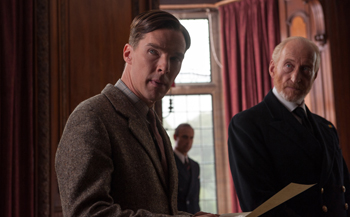 1952, Manchester, England: Police are called to the house of a university professor of mathematical biology, following reports of a burglary. Investigating Detective Robert Nock finds Professor Turing a curious "victim", who appears to be hiding something. Digging into his background he finds his war record has been erased. Nock sniffs espionage, but his investigation is derailed when Turing is arrested for "gross indecency". Nock interviews him, finding his true background a revelation and is sickened when the shy academic is convicted.
1952, Manchester, England: Police are called to the house of a university professor of mathematical biology, following reports of a burglary. Investigating Detective Robert Nock finds Professor Turing a curious "victim", who appears to be hiding something. Digging into his background he finds his war record has been erased. Nock sniffs espionage, but his investigation is derailed when Turing is arrested for "gross indecency". Nock interviews him, finding his true background a revelation and is sickened when the shy academic is convicted.
Clarke visits Turing and finds him a shambling shadow of his former self, his brain clouded by synthetic oestrogen – the 'chemical cure" which he opted for as an alternative to prison. He is still trying to work on a newer model of Christopher, but is unable even to manage a crossword puzzle.
1954: Police are again in attendance at Turing's house. The troubled genius has committed suicide – a half-eaten apple dusted with cyanide is by his bed.
His machine was never perfected, though it generated a whole field of research into what became known as "Turing Machines". Today we call them "computers".
The Imitation Game
Release Date: 1st of January, 2015
About The Production
The incredibly true, yet largely unknown story of British cryptanalyst Alan Turing spread like wildfire among the Hollywood community in December of 2011. It was then that Graham Moore's nascent screenplay illuminating Turing's life, The Imitation Game, placed first on the legendary Black List – Hollywood executives' ranking of the most-liked yet still unproduced screenplays.
Teddy Schwarzman, head of film production and financing company Black Bear Pictures, was hooked at first read. "It was a real page-turner, but so dense, so rich with historical significance, with a riveting, misunderstood protagonist. It was a script where you very clearly saw the movie and it was written in a very intelligent way, with highly stylized dialogue, but never putting anything at the forefront other than the characters." Schwarzman knew it would fit perfectly into Black Bear's canon: original, engaging and complex character-driven stories such as their recently acclaimed All Is Lost, starring Robert Redford.
The script's inception had a richer history than many knew. In late 2009, Bristol Automotive producers Nora Grossman and Ido Ostrowsky caught a news report of a speech by Prime Minister Gordon Brown, apologizing on behalf of the British Government for the treatment of Alan Turing after World War II. Not familiar with Turing's story, they researched and discovered an extraordinary life unknown to most people, particularly in the US. They immediately optioned Andrew Hodges' Turing biography and were discussing it a party, where the guests included Graham Moore. The young novelist professed his love for Turing and the trio hatched a plan for a script. The title of a post-war paper Turing wrote served as Moore's inspiration. It detailed a method Turing invented to determine whether something is a machine or a real person. A test of sorts, but to Turing, a game – The Imitation Game.
The fall of 2012 found Nora Grossman and Ido Ostrowsky seeking a new home for the project after a possible studio collaboration. Amidst a pack of suitors, the team met Teddy Schwarzman and a partnership was expeditiously born. Teddy Schwarzman, Nora Grossman and Ido Ostrowsky and Graham Moore found that they very much wanted to tell the same story the same way, paying homage to an extraordinary life while honoring the tale's most challenging and unique elements.
"It's an amazing life story," marvels Graham Moore. 'It's one of those which, if you'd made it up, wouldn't have been believable: that one person lived through so many dramatic things, that one person is a genius, a war hero, invented the computer, was prosecuted by the Government for homosexuality and committed suicide – it's all these movies in one. It's shocking that it's true. ' Despite the extraordinary circumstances surrounding Turing's life, the team all identified a personal admiration for and connection to his story.
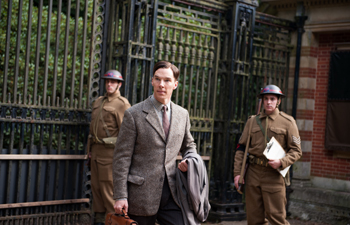 Teddy Schwarzman shares Graham Moore's enthusiasm: "It's a story that the world needed to hear. The Poles and Brits had worked on breaking the code for years and hadn't made sufficient progress, so to have a professor walk into to Bletchley Park with no real training and find a way to solve an impossible problem, is just riveting. I wanted people to know what Turing had accomplished before, during and after his time at Bletchley Park. He was embraced for his uniqueness and in the process, saved countless lives.
Teddy Schwarzman shares Graham Moore's enthusiasm: "It's a story that the world needed to hear. The Poles and Brits had worked on breaking the code for years and hadn't made sufficient progress, so to have a professor walk into to Bletchley Park with no real training and find a way to solve an impossible problem, is just riveting. I wanted people to know what Turing had accomplished before, during and after his time at Bletchley Park. He was embraced for his uniqueness and in the process, saved countless lives.
From a thematic standpoint, Teddy Schwarzman also connected with the script. "I tend to appreciate the outsider, the thinker, who's doing things that others deem extraneous or superfluous or wrong and yet who, through his own sheer will, finds a way to make an impact. This is the story of one man who made something from nothing, profoundly influencing generations to come." Graham Moore was taken by Turing's work – and the tremendous breadth of his devotees. He recalls, 'When I was a teenager, I was massively into computer science. I went to computer camp. I was really into programming and, among computer science folks, Turing is this object of cult-like fascination. Because he was this unheralded early inventor of the computer, to whom history hadn't done justice, he was always talked about, from the Steve Jobs's and the Bill Gates's of this world, right down to little teenage me. I feel that this film is the most important thing I will ever be a part of. I don't know that I will get to do anything I love so much ever again, but I'm very glad I got to do it this time."
With their vision in place, the producers set out to assemble an artistic team as passionate and impressive as the material itself. "We knew we had a script that was special, that combined a conventional biopic, a character study and a thriller, so we knew we wanted a director who wouldn't deliver the sort of biopic we've all seen before," notes Ido Ostrowsky.
The search for the perfect fit was of great importance. The team knew it was a rare candidate that could synthesize all of the narrative elements at work with the scope and nuance necessary to give Turing's story its due.
"There were a number of truly talented directors interested in making this film, and we were honored by their interest," Teddy Schwarzman recalls. 'The film had an American writer and American producers, so we knew right away that the film must be shot in the UK to ground it in its historical roots. ' But it was an unlikely choice that blindsided the team. 'Ultimately it was a Norwegian who blew me away with his true understanding of the characters. Morten Tyldum knew what was driving everybody in the story and that it was a story of love and loss and triumph."
Still a relative unknown in the U.S., Norwegian helmer Morten Tyldum had directed several films in his native Norway, including the BAFTA-nominated Headhunters. "I just loved, loved, loved that film. If you take apart all the elements that were embodied in that film, they all translate to the individual aspects that are needed in ours. There is a sense of propulsion, a sense of tension, a race against time, a hunt that is happening. There is an unlikeable protagonist who we can't help but invest in. There is humor and levity at times, when it is very much needed. There's a sense of artistic mastery in the way that the film was shot where, if we had a director who did something of that much skill on that film and passionately enough to tell that story, I felt very confident that he could do something really special with ours."
Teddy Schwarzman emphasizes, "You need someone inspirational as your director, you need someone confident in their vision, but at the same time, collaborative in their process, with emotional sensitivity and who really understands what type of performance they're looking to put on the screen. And I left my two meetings in 48 hours with Morten Tyldum, feeling completely confident in his vision for the film."
For Morten Tyldum's part, staying true to Alan's iconoclastic roots was essential to bringing The Imitation Game to the screen. "It's a very important story that's a tribute to being different and how essential it is to have people who think differently, not following a norm, in society," says Morten Tyldum. 'Turing faced a great injustice, but never compromised his ideals. And the world is better because of his bravery."
Morten Tyldum saw a bit of that outsider status in his own role and wanted to use his non-British heritage to the film's advantage. "I think it's good to have an outside view of it, as it naturally leads to an emphasis on the universal elements of the story. This was a special time in British history, make no mistake. But these ideas of Alan's, they were so much bigger than the time and the war. So, I think this movie is more than just a period drama. It's much bigger and much more important than that."
With Morten Tyldum in place, attention turned to casting the role upon which the entire film rests. The film needed an actor that could synthesize Turing's genius, his humanity and myriad complexities. "Even before I got this movie and even before he was established in the USA, I said Benedict Cumberbatch must play Alan Turing," remembers the director. 'I think Benedict Cumberbatch has that mix of sensitivity and strength and there are not too many people who can portray a genius and for it to become believable. There's so much inner life that he conveys. You really believe that Benedict Cumberbatch becomes Alan Turing and you one hundred percent believe that this man is capable of generating these big ideas."
Graham Moore recalls his excitement of finding the match for Alan. "Benedict Cumberbatch coming on board felt like winning the lottery. He is in almost every frame of this movie. There are very few actors in the world who can handle a part like that. Turing is not only a genius, but he's gay. He's not only gay, but he's closeted. He's not only closeted, but he has to win the Second World War. Benedict Cumberbatch doesn't just convey the intelligence of Alan Turing, he embodies it. His level of devotion to this character is a level of devotion that would rival Alan Turing himself."
"You have to believe the actor playing Alan Turning is incredibly intelligent – and with Benedict Cumberbatch that's never in question," echoes Ido Ostrowsky. "You can see how sharp he is and how curious he is and also how mysterious and enigmatic he is." It was a unanimous sentiment.
The next challenge was finding the actress to play Joan Clarke, Alan's sparring partner in both work and life, and a brilliant mathematician in her own right. A woman ahead of her time, Joan is a multi-faceted character that would require an actor of veteran skill. Enter Academy Award® nominee Keira Knightley. "I was thrilled that Keira wanted to play Joan," says Morten Tyldum. "She brought so much power, but also vulnerability to the character. She steals the scenes she's in. She's marvelous and I think quite different from her performances in other period films. She is able to portray someone who is as capable and intelligent as Turing himself. And it is because she possesses all of these qualities that Alan does not, that she becomes so important in his life. There's such a great chemistry between them."
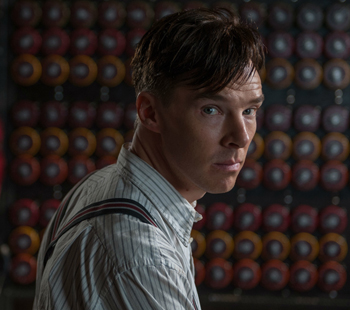 The final piece of the atom in the Bletchley nucleus belonged to the role of Hugh Alexander. Another exceedingly accomplished man, Hugh Alexander possesses a winning charm and extreme good looks in addition to an exemplary affinity for numbers.
The final piece of the atom in the Bletchley nucleus belonged to the role of Hugh Alexander. Another exceedingly accomplished man, Hugh Alexander possesses a winning charm and extreme good looks in addition to an exemplary affinity for numbers. Building the ensemble led to an embarrassment of riches of British talent. "I have the perfect cast," Morten Tyldum says. 'It's impossible to look away from Mark Strong - in every scene he's in. Charles Dance brings such authority to his role. He's born to be this military leader. Rory Kinnear gives such a layered performance as Nock. And the codebreakers – Allen and Matthew – I'm so lucky to have worked with this group of actors. I can't praise them enough."
While historical accuracy was paramount on the filmmakers' agenda, Graham Moore highlights the creative enhancements that heighten the experience of the film. Detective Nock, for example, played by Rory Kinnear, is a conduit for the audience's involvement in the story. "Detective Nock is a fake name – he was named after my old roommate," admits the writer. "He gives us another perspective – putting the audience in the head of the police officer who arrested him, we can see how a normal person, not a bad person, could end up doing this horrible thing to Alan. We didn't want to create this story of Alan being a sad character that bad things happened to, so we decide to show his final years through the perspective of this fictional detective. We used Nock to create this mystery around Turing – who is he? What makes him tick? It also helps to make the audience feel culpable about what happened to Turing. Nock is not a bad person, not an evil person. The terrible thing that happened to Turing was not his fault and was deeply unfair and the injustice of that is something we all have to reckon with."
To complement the pedigree of the cast, the filmmakers needed a top-notch production team. Tyldum had a specific visual schema in mind from the start and without sacrificing realism, wanted the absolute most dynamic version of the visual look. Morten Tyldum notes: "I wanted cinematographer Óscar Faura to do the movie after I saw The Impossible – it was so beautifully shot. I saw The Orphanage immediately afterwards and the way he lights it is so beautiful and atmospheric. I'm delighted to have found a director of photography who's so respectful of the period, recapturing its tragic elegance in such a pronounced way."
Production designer Maria Djurkovic had Morten Tyldum's admiration from the start. 'She gave me so much, recreating that world and also Sammy Sheldon Differ the costume designer who made it all unglamorous, but intriguing and stylish. I had wonderful heads of department for the whole shoot.
"The crew in the UK was very professional and their work was to such a high standard. It was a very multicultural and international production - we had a Norwegian director, American producers, a Spanish camera team and a British crew and it all worked very well."
Maria Djurkovic's production design was not restricted by the exigencies of the wartime environment: " My job is to respond to the script – for me the most important thing is finding an overall aesthetic for the film – and it's not just about it being a period film, set between this year and another year, the historical research is part of our DNA, that's taken for granted.
"There are certain expectations people have of a period and I always like to slightly subvert them. And I'm also trying to make sure that every location choice and every design choice works aesthetically as an overall entity and is not just cut into different scenes. The look of the films that I design tend to have a slightly heightened quality.
"The 1940s' color palette was pretty drab, but actually, if you start looking at the research material, the thing that's central to this film in design terms is Turing's creation of the Bombe, his code-breaking machine, so that's our starting point. Going to Bletchley and actually seeing it functioning was wonderful, this extraordinary lumbering thing, with a million red cables spewing out of it.
"We had to make the Bombe look as though it works, with all its dials going round. It has to look like the real thing, but it has to look more interesting than the real thing! And we had to do it with limited money and limited time. It's the first computer, it's incredible, this amazing invention and without it, who knows what would have happened? It's not just central to our film, it's central to our history. The real thing is within a Bakelite box, so we decided very early on that, to make it more interesting, our 'Christopher' would look as it did before it was encased in the black box, so you actually see its guts and its entrails!"
Costume designer Sammy Sheldon Differ also found herself challenged to present the most dynamic version of the period. "Morten didn't want it to have that subdued 1940s feel, he wanted it to have a bit more life to it than that, so we talked about the use of color – some of the photos I had researched were in color – and there was more of it at the time than you would imagine. It interested me that there were these blues and reds and greens that aren't often conveyed in films and TV about this period. We looked at the real characters that are in the script and I wanted to convey as much as possible of who they really were and as faithfully as possible, but also using color as a way of telling the story.
"We tried to use clothing of the period as much as possible – we looked for coupon clothing, with the CC41 label in, which was given out under rationing. Benedict Cumberbatch had done a lot of research and, when he put something on, he knew if it felt right. '
Alan Turing's story made a deep and lasting impression on the director, producers, cast and crew and Benedict Cumberbatch relished the opportunity to walk in the great man's shoes. "Filming at Bletchley Park was extraordinary – just to be on those grounds and walking across those lawns and under those trees which were there before they were and will be there long after us. It's such an important part of our history and our secret history and there were those moments when you'd think there was something rather ghostly about what we were doing." Graham Moore sums up the feelings of all involved: "The story of Alan Turing came to a very tragic end, but we wanted to make a film that was a celebration of him and of his life, as well as his work. I hope this film will bring people close to a difficult and complicated figure, which they would not otherwise have been able to do. He's unlike anyone any of us will have ever known and it was always my goal to make the audience feel close to him, to put them inside his head, into his experiences. I hope that they will look up at the screen and feel that they understand this person, who is very removed from them in history, in time and place – and that they get a sense of what a tremendous human being he was."
The Imitation Game
Release Date: 1st of January, 2015
Have You Seen This?
MORE


